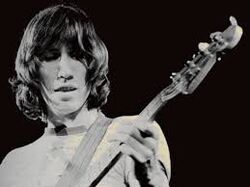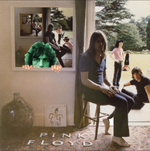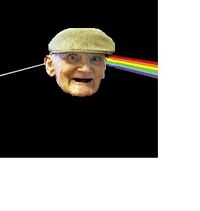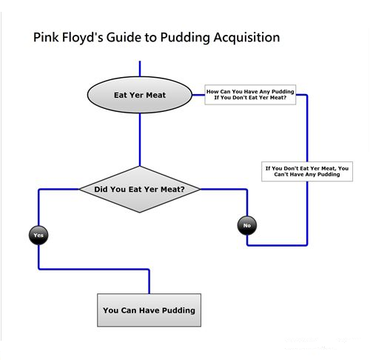Roger Waters
George Roger Waters (born 7 October, 1944) is an English musician who was partly responsible for forming the band Pink Floyd in the 1960s, and mostly responsible for trying to break it apart in the 1980s. He is known for looking young in his old age, old in in his young age, and middle in his middle age. At the age of sixteen, he managed to get a free bus pass and draw a state pension. Waters was often seen being helped across the road by do-gooders of a similar age, or being approached by the elderly twittering on about the youth of today.
Contrary to popular belief, it was Waters who started the dad-jean-shirt-belly-over-belt craze, not Paul McCartney who, at the time was going through a rather awful Englishman-shirt-belly-over-kilt phase, while tossing cabers with an entire bagpipe troop on the Mull of Kintyre.
Early life
George Roger Waters (born 6 September 1943) the younger of two boys to Mary and Eric Waters in Surrey. His father who was the son of a coal miner, Labour party activist and late night dancer, was a schoolteacher, a devout Christian, and a godless Communist. During the early years of World War II his father was an ambulance driver, and was strongly against the war. In early 1944, however, he had a change of heart and drove his ambulance all the way from Surrey, Great Britain to Aprilia, Italy in an attempt to join the British army, however, he was using one of the first road maps produced by Tom Tom and ended up driving his ambulance into the English Channel. His ambulance was found on 18th February 1944, but the body of Eric Waters was never recovered.
Following her husband's suspected death, Mary moved both her children to Cambridge and raised them there. Waters attended the Fletcher Memorial Junior School in Cambridge and then the Cambridgeshire High School for Boys (Later renamed Hills Road Six Form College, then back to Cambridgeshire High School for Boys, then back again) with Syd Barrett.
At age 15, Waters was the chairman of the Cambridge Youth Campaign for Nuclear Armament and a keen sportsman and a highly regarded member of the high school's chess club. Even with all of this however, he hated his educational experience; according to him, 'I hated every minute of it, the school's regime was an oppressive one, the bullies were bullied, the bullies that bullied the bullies were bullied, and the bullies that bullied the bullies that bullied the bullies were bullied'. Waters also knew David Gilmour during these times, a popular bully from a different school. Having enrolled at the Regent Street Polytechnic in London to study architecture in 1962, Waters found the other future members, Richard Wright and Nick Mason who, strangely, seemed to be more into music than bullying, and not that into architecture either.
Early Pink Floyd
By 1963, Waters and Mason had lost all interests in doing their studies; they had moved into the lower flats of Grantchester Meadows, owned by a seclusive drunkard by the name of Mike who's only form of contact was tutoring at Regent Street Polytechnic every few months or so. Waters, Mason and Wright first played music together in the autumn of 1963 in a band formed by vocalist Keith Noble and a strange man who said his name was Clive who played the bass. They usually called themselves Sigma 6, but also used the name 'The Meggadeaths' until Dave Mustaine filed a lawsuit due to copyright allegations. During this time, Waters played rhythm guitar, Mason played drums, Wright played on anything he could find (Including Noble's Sister's Cat, once). In the early years the band performed at private functions (usually without permission) and rehearsed in a Tea room in the university's basement.
When Noble and Clive decided to leave the band and form their own group in 1963 the remaining members asked Barrett and a guitar player named Bob Klose to join. By January 1964, the band became known as the Abdabs, or the Screaming Abdabs, or The Exploding Abdabs. During the autumn of 1964, the band used the names Leonards Lodgers, Leonards De Vincis and the Leonards Nemoys, but eventually settled on: Cup of Tea and The Biscuits. Sometime during the autumn of 1965, the band began to call themselves The Yellow Floyd, later The Red Floyd, then Tempestuous Aquamarine Floyd, then in 1966, Pink Floyd.
By 1966, the bands repertoire consisted of mainly Rhythm and Blues songs and they were beginning to receive paid bookings, including one performance at the Marquee Club in March 1966, where Peter Jenner (Not to be confused with Bruce Jenner, or what ever he/she is calling himself/herself now) noticed them. A lecturer at the London School of Economics, Jenner was impressed by the sonic effects that Barrett and Wright created, and became their manager with promoter Andrew King. The two had little experience in the music industry and brought the band £18 worth of instruments with money "borrowed" from Kings mum's purse. With Jenner and King's guidance the band stopped playing music and started playing "noises". The new sound became popular in London's underground music scene, as Floyd's soundtrack closely resembled the actual London Underground, especially at rush hour.
The band started playing noise at various venues, including a Catholic youth club, where in Catholic circles, getting a "Pink Floyd" means something very different indeed, so refused to pay them, and Jenner and King attempted to sue the pants off him, but failed, as that was the point of the booking in the first place. Eventually they were able to gather a small following while playing in the U.F.O club in London experimenting with long instrumental excursions and interesting lighting effects to an all-but-unconscious audience. It should also be noted that during this time Barrett was the lead singer, guitarist and composer, whenever he could remember.
In 1967, the band had attracted the attention of the mainstream music industry, and ended up recording a few singles such as Arnold Layne which was about a local man stealing ladies underwear from washing lines, with the b side Some Randy and abhorrent fun. The single managed to get to number 20 in the U.K. Music charts, despite being banned for the sexual perversions alluded to in Arnold Layne. Three days after its release, the Band signed with EMI and soon after recorded the tamer See Emily Play faring much better than "'Arnold Layne"', the single managed to get to number 6 in the charts.
The Piper at the gates of dawn
Pink Floyd's Booking Agency, along with EMI producer Norman Smith, negotiated Pink Floyd's recording contract for their first album at EMI studios London. While Mason recalled that the sessions were trouble free, Smith disagreed, stating that Barrett was unresponsive to his suggestions and constructive criticism. It was unclear immediately whether Smith was making a medical diagnosis, but Mason then responded by calling Smith an asshole, Smith then responded by stating that Mason was an asshole, then Mason threatened to kick Smiths arse; so everyone concluded Barrett was actually responsive, and they all just being assholes. EMI Columbia released The Piper at the gates of dawn in August 1967. The album peaked at number 6 in the U.K charts and stayed there for 14 weeks.
Saucerful of secrets
Recorded both before, after, and during Syd Barrett's departure from the band, the album was devised in the lavatory of EMI's Abbey Road studios due to the fact The Beatles had to use every studio to record The White Album. With recording in the lavatory, the Pink Floyd had to be very creative, including one instance when The Beatles had to use the Floyd's studio urgently, after Tikka Misala for lunch. The 12 minute song Saucerful of secrets was recorded shortly after John Lennon's consumption of the misala but the band cleverly weaved the sounds to the song. It is well known by avid Pink Floyd fans that if you listen very hard to the song, you can clearly hear George Harrison in a panic, farting and banging on the door of John Lennon's trap (where Wright also happened to be trying to lay down a long and noodley "synth solo"). The band faced many challenges such as these, and eventually the smell got to Barrett's head and during the recording of the song Corporal Clegg Barrett dropped his guitar and left saying to the band 'The sea isn't green, and I love the queen but what the fuck has Paul McCartney been eating?'. After that, Barrett left the band, and reality, and went on to record two solo albums.
Barrett's departure from the band didn't stop Waters, he immediately replaced him with David Gilmour, finished Corporal Clegg (With Mason singing), had tea, and recorded the rest of the album. In light of their experiences Pink Floyd considered calling their album "The Brown Album" as a nod to their time with the Beatles at Abbey Road. Another serious consideration was to call it a "Bowl full of secrets", after Barrett's experience of McCartney's post-curry "visit". In the end the band settled on "Saucerful of Secrets". It peaked at number 9 on the UK album charts, not as high as their first but the band didn't care, the people buying their vinyl back then, were all high as kites anyway.
Ummagumma
Ummagumma represented a departure from their previous work. Released as a double album, with one quarter being live and three quarters being something. It was a departure from music to noises, lots of noises. After Barrett walked out, the band had no idea who was going to write the songs, this album shows that a band as cool as Pink Floyd can get away with releasing anything (Provided that it doesn't sound loud and extremely 1980s). Ummagumma is a mixed set, with some pretty good live songs, some enjoyable instrumentals and Waters yelling at several species of small animals that he gathered together in a cave. It should be noted that Barrett was also stalking the band during this time. It should also be noted that Ummagumma is Cambridge slang for sex, the song names such as The Narrow Way prove this theory.
The album reached number 5 in the UK music charts and is currently rated 7 out of 10 on the Great Rock Discography. Which is also again proves that Pink Floyd can release anything because of their sheer awesomeness.
Atom Heart Mother
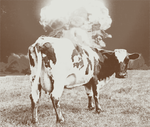
In 1970, the band began to shift away from their previous psychedelic, uber-cacofonic space banging persona and began to shift towards a more depressing/goth/FTW type of persona. This album was the first to show signs of this shift with its themes of Nuclear War and the end of days. It was also the bands first use of an orchestra, as they had been playing "noises" together so long, they had forgotten how music works. The album reached number 1 in Britain and is currently the band's favourite album.
It also contains Wright's last contribution to the band, Summer 69' Later changed to Summer 68. The song itself was banned in 8 countries including, Saudi Arabia, Soviet Union and New Zealand due to it's graphic content. A portion of the song went: Would you like to stay, and get down your knees. Perhaps you'd care to state, exactly how it feels.
The rest of the song was simply far too dirty to even belong on this page. But that was the last time any of Wright's ideas were allowed on one of the groups albums.
Meddle
Meddle was the sixth studio album by the band. Barrett had decided to stop following the band and went to his home, in a quiet suburb of Bonkersville. The orchestra from the previous album was misplaced in baggage handling on the way home from their creatively named North American Atom Heart Mother on tour, leaving the band without backup noise. Getting bored of the new car, caviar and four star; the daydreaming group devised a novel experiment to get things moving again, by building themselves their own song writing robot called Leckie (short for electricity), out of parts of Beatles audio equipment stolen from Abbey Road Studios. After building the songwriter, the band were rather taken aback when Leckie told them that their noises were just noises; and they would’ve had the same reaction from the UFO crowd playing Rhapsody in Blue by Gershwin or strangling a cat. Constructed of Beatles parts, the robot was more into progressive rock and openly disappointed at the lack of screaming girls and side-burned, alcoholic footballers. The band, clearly upset by the comments, thought about unplugging Leckie, until the robot asked how many of their albums did they actually listen to in the car, the band just muttered and started shuffling their feet a bit.
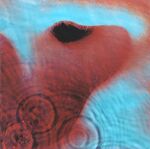
Leckie set about writing a very long, but coherent musical piece with harmonious singing, tight instrumentals and extended noodley guitar solos . The band agreed this was far better than anything they had done before, so the group packed up and went to a Pompeii amphitheater, to play the song at volume 11. Unfortunately, being a Liverpudlian, Leckie overheated in the sun and exploded. All was not lost though as the echoes of the explosion gave them the name for the song, and Leckie had provided the inspiration for the band to attempt actual music on their next album.
With the b-side taken care of with Echoes, but with no song writer (again), the band reverted back to noise for the A side, mainly recording larger bits of Leckie being hit with smaller bits of Leckie.
Meddle reached three in the UK album charts, went gold in 1973 and went Platinum in 1994, when playing “noise” at high volume in London nightclubs became fashionable again for a while.
Obscured By Clouds
By 1972, Pink Floyd had already created soundtracks for a mixture of films, most of which were slow 1960s hippie crap. This time however the band were asked to make the soundtrack for a French film, by a director named Barbet Schroeder for a film he was creating about a valley and called The Valley. The band had already made soundtracks for him and decided to do another one for the hell of it. The group had already started to create The Dark Side Of The Moon at this point and had already recorded some basic tracks and performed them live to an unsuspecting audience but the work was interrupted due to the fact that the band travelled to France on two separate trips while trying to compete with the wily Japanese while on a tour and at the same time write and record music for the film.
As they had done before, the band watched a rough cut of the film and noted down certain timings and cues with a stopwatch. When they did this they created the soundtrack, had tea, and sent it to Schroeder. After the soundtracks release, it got to number 1 in France, number 6 in the UK and number 46 in America.
In 1973, the song Free Four was made a single in the America, and was the first of Pink Floyd's singles since See Emily Play to not get immediately made into a novelty coaster. The song was an upbeat and jumpy song about the shortness of life and the infinity of death. Lovely.
Dark Side of the Moon
As Soon as Obscured By Clouds hit the shelves, the band was at Abbey Road Studios continuing work on their newest project. This time they decided to build on Leckie's previous ideas, and their previous noise. The album, despite building on their noise lacked the extended noises made by Barrett that used to characterise their work on the previous albums. The themes on Dark side of the Moon include conflict, greed, the passage of time, the passage of lying in the sunshine, staying home to watch the rain, being young, life being long, killing time today and then one day finding that ten years have got behind you, no one telling you when to run, and missing the starting gun.
A lot of the music on the album came from unused demos made in Water's shed, half of which were scratchy tape recordings of Barrett heavily breathing into a microphone, most of which were made at nights shortly after his departure from the band. A few of these demos were half good though, and they were used as inspiration for the tunes on the album.
The new material was recorded at Abbey Road Studios, the band was now making sophisticated approaches to recording by using custom tape loops and 16 track tape recorders. Wright's brand new Analogue Synthesizer was used in several tracks, and also voice recordings of their road crew. The Alan Parsons Project was responsible for some of the albums most sonic aspects and the recruitment of Clare Torry to scream throughout the album. The cover design (Pictured Right) was designed Storm Thorgerson, who was given the idea from Wright who asked for a 'simple and bald design'.
The album topped the charts for a week after its release, and stubbornly stayed there until 1988.
Wish you were here
After the astounding success of Dark Side Of The Moon, the band were ready to make a second one of the sort called The sort of light side of the moon, you know, the one facing the Earth, the album was supposed to be the exact opposite of the previous one in every way. They recorded a few tracks, utilising again Wrights synth and The Alan Parsons Project. During the recording sessions of the song The god awful gig underground, the band realised that what they were making was crap, so they stopped screwing around and started to actually get serious.
So then the band decided to go in a different direction and make something completely different. So they all looked to Waters for guidance, Waters however, had been looking to Mason for guidance, Mason however, could not write a song to save his life and looked to Gilmour for guidance, and no one cared about Wright. As soon as they realised that none of them had any ideas they immediately all wished that Barrett was there to help them write. That was when they all finally got ideas, this time though, instead of making noises and using effects, they made music. Every song on the album was about Barrett, well actually, some of them aren't but why does it matter?
Shine On You Crazy Diamond Sessions
During the final mixing of the song Shine on you crazy diamond one day before the band went on another tour, and the same day that David Gilmour got married. A fat man with a shaved head and eyebrows walked in to the room holding a plastic bag and sat down and stared at the band. Waters, who was working in the room at the time, presumed that he worked at the studio and didn't care, Wright, also mystified at the identity of the man, walked up to him and asked him who he was. it was Syd once-hot-but-now-not-Barrett! They were horrified due to the fact that there was a look in his eyes, like black holes in the sky. They were horrified, and immediately started to cry, then got back to work, leaving Barrett to stare. Barrett lingered around a bit staring, eating, and brushing his teeth, then just sort of wandered off.
Animals
As the fascist little punk revolution was setting in, Waters proclaimed himself as the embodiment of Pink Floyd and decided to create an album completely written by himself. On stating his plans to the band, he encountered unexpected resistance from Wright who had conformed to the punk revolution and called Waters a fascist and spat in his face, Waters, refusing to let himself look emasculated then beat up Wright. After this fiasco Waters sat down and wrote a whole album about animals. The idea for the animals came from George Orwell's Animal Farm, but the idea for an album about animals came from the 1976 punk nursery rhyme Old McDonald's a big fat corporate bastard. Seeing as though Wright was in hospital recovering during the recording of the album, he had barely any input on the album. This angered Waters due to the fact no one else was willing to put forward their ideas and he had to do everything. The album itself featured a scathing critique of people and politicians.
In 1977 the album was released receiving a poor review from the fascists at Rolling Stone Magazine After reading the review David Gilmour, afraid of what Roger would do then fled to France to record his first solo album David Gilmour with his brother. Animals other reviews were pretty good however and the album reached number 2 in the UK and number 3 in the US (And Number 1 in Austria) but again, who cares?
The Wall
After the release of Animals in 1977, the band embarked again on another tour, this time creatively calling it the In The Flesh Tour around America again. The tour was both critically praised for its outstanding use of effects and how well the noises were distributed, and despised by critics who no matter how they tried could not get backstage, and the worms ate into their brains. The worms of course had escaped from Mason's worm farm that he took everywhere with him, that had a larger capacity than most worm farms and also glowed in the dark, another dynamic effect brought to you by Pink Floyd. The In The Flesh Tour was also a very different tour for the Floyd due to the fact that it was played in larger venues than their previous venues, where, as they used to play in Halls and other posh venues like that, they now played with the peasants in large stadiums. This caused more problems than first perceived, the first problem was the fact that the band had to play within 20 feet of the rabble, and big stadiums of course attract Douchebags with fireworks and flares mainly because most of them are too drunk to realise what is actually happening around them. The idea for The Wall came from a minor incident that occurred at one of these concerts, where the audience were particularly rowdy. For the entire concert the audience were making more noise than the band, the band took this as a challenge to make the loudest noise and attempted to do so. But every time the band tried to one-up the crowds noise, the crowd would get louder, this went on for a while until the band had gone all the way to 10 but realised they had nowhere to go from there. Seeing as though the audience felt they had won, they decided to let off a few celebratory Fireworks. Waters, who had forgotten to bring fireworks as well, became envious and shouted to the audience
"Aww for fucks sake! Stop letting off fireworks and shouting, we're trying to make noise!"
The audience however, did not take this seriously and just cheered. Making Waters feel emasculated, the band, knowing that they would not like Waters when he feels that way, were nervous. Gilmour got so nervous, he snuck off the stage. However one poor man, oblivious of the growing tension, tried to climb on to the stage to meet the band, and had the sad fate to be spat on by Waters who at the time, had a cold and spat phlegm on to the poor bastard.
Horrified at what he'd done, potentially giving an audience member a cold, Waters went to his hotel room and locked the door, he wished that he could build a wall between himself and the world, at which point he decided to make an album of music, this time a rock opera about a person who is a neo nazi and his classmates get minced by their teachers in a giant mincer. Waters also decided to make a movie of the same name and same music, however in his crazed state he also decided to make the movie half cartoon, 3 eighths music video and 1 eighth a movie. Seriously it's pretty good but you need to watch it a few times before you can truly appreciate it's horrifying beauty.
The Final Cut
Falling deeper in his Gilmour induced depression, Waters pushed himself to write The Final Cut, a dark, gloomy album of which he was determined to make as difficult to produce as possible.
He had started his master plan earlier by firing Rick Wright, making the vital keyboards mix near impossible. However, David learned from his previous encounters while re-recording Money for the compilation album "A Collection Of Great Dance Songs," and managed to do the keyboards.
Furious, Waters tried Phase II: screwing up the drummer. He deliberately wrote the closing track "Two Suns In The Sunset" in an irregular time form to confuse Nick Mason. This almost worked, as Nick was too busy with cutting the crusts off his pies to properly learn it. However, the studio called in a session drummer that could fill Mason's shoes.
Already mad enough, Roger was ballistic when he found out that David had called in the session drummer.
He then resorted to Phase III: directing all of the torment onto Gilmour himself. Waters did this in numerous ways, like only allowing him to sing on the worst track (a major blow for Dave), demanding contributions everyday by simply repeating the phrase that Syd had taught him "Have You Got It Yet?", and even removing Gilmour's producer credit just before the album was mass produced.
Waters had succeeded in sharing his misery with everyone he worked with. However, he had also exhausted himself with all of the effort his was putting into Operation G.I.L.M.O.U.R. (Greedy Idiot Loving Money Openly Understanding Rage), mostly on coming up with the name, as he was determined to have it spell out Gilmour.
Then he left the band.
Later years
In 1985, Waters decided that he finally had enough money, and he was a self-proclaimed God, so he decided to quit the band. This did not go down well with Gilmour, so he Mason, and Wright kept the band going, even though it was almost the 90s, and it's been over twenty years since the band originally formed.
In 1987, Pink Floyd returned with David Gilmour as the the lead changing the name to the Gilmour Girlz. The released an album without Waters named 'A Momentary Lapse Of Reason' and it featured many hit songs such as: uuuuuh....
This greatly upset Waters, as it was his band. He sued the pants off of Gilmour for stealing, recording, and calling his work as his own. It is known that Waters missed his nap that day.
After a long custody battle for Wright and the rights to an inflatable pig, Waters lost and crawled into the misty mountains for a year living on live fish and talking to himself before coming back and releasing his pulitzer prize winning book: The pros and cons of hitchhiking.
This once and for all ended Pink Floyd, which upset teens that wished they were born earlier everywhere. But The Division Bell sucked, anyway. Except 'High Hopes' that song was amazeballs
Waters faded into obscurity for a while, having one-night stands like all of those creepy old musicians do. (i.e. John Deacon, Paul McCartney)
Though, in 2006, Barrett, while on his way to the shops became caught in the crossfire of two rival gangs, the Childhood's (From West-End) and Stardoms (From East-End). Barrett was then rushed to the hospital but died shortly after, so the band came back together for one show. This was a huge success, and granted Waters even more money. After the show, Mason, Gilmour, Write, and Wallers went back to their own lives: collecting cars, hating each other even more, having children at a really old age.
Waters had no more interactions with the public from that point on, except for the NSA document that he accidentally released to the public eye in 2010, which did not go down well with the United States Government.
| Featured version: 10 November 2016 | |
| This article has been featured on the main page. — You can vote for or nominate your favourite articles at Uncyclopedia:VFH. | |
| Preceded by: Syd Barrett |
Roger Waters 1967-1986 |
Succeeded by: David Gilmour |
